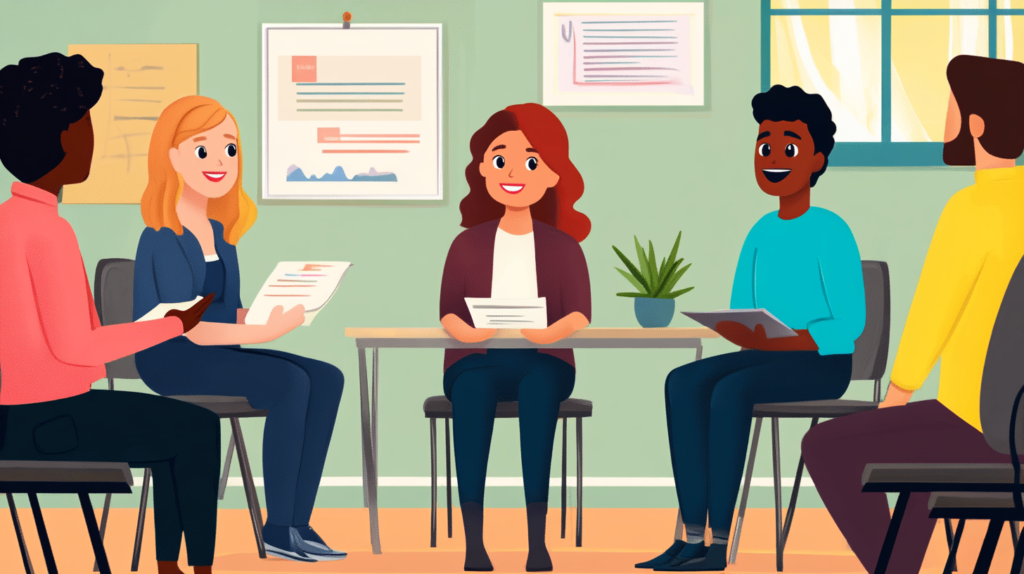Ultimate Interview Guide to Land Your Dream Job – Proven Tips

Interviews are often seen as nerve-wracking experiences, but with the right preparation, they can be a stepping stone to your next big career move. This comprehensive interview guide is designed to help you navigate each stage of the interview process, from preparation to follow-up. Whether it’s your first interview or you’re a seasoned professional looking for a refresher, these tips and strategies will help you leave a lasting impression on your interviewer. You’ll discover effective interview techniques, explore common questions, and learn how to answer even the toughest challenges confidently.
Table of Contents
- Interview Preparation: Laying the Groundwork
- Understanding Behavioral Interviews
- Interview Tips for a Lasting First Impression
- Common Interview Questions and How to Answer Them
- Interview Etiquette: Dos and Don’ts
- Navigating Phone and Video Interviews
- Body Language and Dress Code: Non-Verbal Cues
- Follow-up After the Interview: Sealing the Deal
- FAQ
Interview Preparation: Laying the Groundwork
Proper preparation is the foundation of a successful interview. Preparing for an interview involves more than simply reading about the company; it’s about practicing your responses, understanding the role, and getting comfortable with the types of questions that may come your way.
Research the Company and Role
Before your interview, take time to thoroughly research the company and the job description. Understand the company’s values, recent projects, and industry position. This helps you tailor your answers to show how you align with the company’s mission and how you can contribute effectively.
Practice Common Interview Questions
To build your confidence, practice answering common interview questions. This doesn’t mean memorizing responses, but rather preparing structured answers, using frameworks like the STAR method (Situation, Task, Action, Result). Practicing will help you articulate your experiences more clearly and concisely.
Prepare Your Resume and Cover Letter
Ensure your resume and cover letter are up-to-date and tailored specifically to the job you’re applying for. Highlight experiences relevant to the role and be prepared to discuss anything listed. It’s essential that every detail on your resume can be supported with examples during your interview.
Understanding Behavioral Interviews
Behavioral interviews are a common way for employers to assess how candidates react in specific situations. These interviews often involve questions that start with “Tell me about a time when…” and focus on how you’ve handled real-life situations.
The STAR Method Explained
The STAR method is a popular approach to answering behavioral questions effectively. You begin by outlining the Situation and Task, then describe the Actions you took, and finally explain the Results. This structured method helps you stay focused and ensures that your answer demonstrates your skills clearly.
Common Behavioral Interview Questions
Behavioral interview questions often focus on teamwork, leadership, conflict resolution, and problem-solving. Examples include, “Describe a time you led a team under a tight deadline” or “Tell me about a challenge you faced and how you overcame it.” Prepare several scenarios that you can adapt to different questions.
Connecting Past Experiences to the Role
When answering behavioral questions, connect your past experiences to the responsibilities of the job you’re interviewing for. Demonstrate that the skills you’ve gained in previous roles are directly relevant to the new position, showing that you can add value from day one.
Interview Tips for a Lasting First Impression
Making a strong first impression during an interview is crucial. From your arrival to your responses, every aspect of your interaction contributes to the overall perception of you as a candidate.
Arrive on Time
Timeliness is one of the first signs of reliability that an employer looks for. Plan to arrive at least 10-15 minutes early to account for any unforeseen delays. Arriving early gives you a chance to settle in, review your notes, and feel composed before the interview starts.
Communicate Clearly and Confidently
During the interview, focus on communicating your thoughts clearly. Speak in an enthusiastic yet professional tone, avoid filler words like “um” or “like,” and remember to pace yourself. Confident communication also includes good listening skills—respond directly to what the interviewer asks, and don’t be afraid to ask clarifying questions if needed.
Be Personable
Your technical skills may be impressive, but interviewers are also interested in your personality and how you’d fit into the team. Display warmth and a genuine interest in the role, maintaining eye contact and a friendly demeanor throughout the conversation. Authenticity goes a long way in interviews.
Common Interview Questions and How to Answer Them
While every interview is different, there are some questions that are almost guaranteed to come up. Preparing for these common questions will allow you to answer confidently and stand out as a candidate.
“Tell Me About Yourself”
This is often the first question you’ll face, and it sets the tone for the rest of the interview. Structure your response by briefly mentioning your background, what you’re doing now, and why you’re excited about this role. Keep it relevant and avoid unnecessary personal details.
“What Are Your Strengths and Weaknesses?”
When discussing strengths, highlight those that are directly relevant to the role. For weaknesses, focus on something you’ve been actively working to improve, showing that you are self-aware and committed to personal growth.
“Why Do You Want to Work Here?”
To answer this question effectively, reference your research about the company. Talk about specific aspects of the company culture or projects that excite you and align with your career goals. This demonstrates genuine interest and preparation.
Interview Etiquette: Dos and Don’ts
Good etiquette can make all the difference in a successful interview. It’s about showing respect and professionalism at every stage of the process, from communication to body language.
Dos of Interview Etiquette
Do be polite to everyone you meet at the company. Your interaction with the receptionist or any staff member can influence the perception of you as a candidate. Do also ask thoughtful questions that show genuine interest in the role and company, and do send a thank-you email after the interview to express your appreciation.
Don’ts of Interview Etiquette
Don’t interrupt the interviewer, even if you think you know where they’re going. Allow them to finish their questions before you answer. Don’t speak negatively about past employers or colleagues, as this can be perceived as unprofessional and could raise concerns about your attitude.
Be Aware of Cultural Norms
Etiquette norms can vary between industries and countries. Research these differences beforehand, particularly if you are applying for international roles. Adapt your behavior accordingly to respect the company’s culture.
Navigating Phone and Video Interviews
Phone and video interviews have become a staple of the modern hiring process. Mastering these formats can be slightly different compared to traditional, in-person interviews.
Setting Up Your Environment
For video interviews, make sure your background is clean and professional. Good lighting is important, as is ensuring that your microphone and camera are functioning properly. A quiet environment free of interruptions helps maintain your focus and professionalism.
Tips for Phone Interviews
During a phone interview, focus on your tone of voice since your interviewer cannot see you. Smile as you speak, as it naturally makes your tone sound more positive. Avoid lengthy pauses and try to keep your answers succinct yet informative.
Body Language in Video Interviews
Even though you’re on video, your body language still plays a crucial role. Maintain eye contact by looking at the camera, not the screen. Sit up straight, nod when listening, and keep your gestures to a minimum to avoid distractions.
Body Language and Dress Code: Non-Verbal Cues
Your body language and attire are significant non-verbal cues that influence the perception of you as a candidate. These subtle elements of communication can convey confidence, interest, and professionalism.
Dress for the Role
Always dress according to the company’s culture. When in doubt, it’s better to overdress than underdress. Business attire is generally a safe choice unless the company has a specific casual policy. How you dress shows respect for the opportunity and your professionalism.
Use Positive Body Language
Positive body language includes smiling, nodding, and maintaining an open posture. Avoid crossing your arms, as this can be perceived as defensive. Sit upright to show engagement, and remember that good posture can help boost your confidence as well.
Eye Contact and Handshakes
Eye contact is crucial for building rapport. It shows that you are paying attention and that you’re confident in your answers. If your interview is in-person, a firm handshake at the beginning and end of the interview creates a strong impression.
Follow-up After the Interview: Sealing the Deal
Following up after the interview is an often-overlooked step, but it’s one that can leave a positive and lasting impression on your potential employer.
Send a Thank-You Email
A thank-you email sent within 24 hours of your interview demonstrates gratitude and enthusiasm for the role. Mention specific parts of the conversation that stood out to you, and reiterate your interest in the position. This also serves as a polite reminder of who you are as they continue their decision-making process.
Connect on LinkedIn
If appropriate, connect with your interviewer on LinkedIn after the process has concluded. This can help you keep in touch for future opportunities, even if you don’t get the current position. When connecting, always include a personal message to maintain a professional tone.
Reflect on Your Performance
Take some time to reflect on your performance after the interview. Identify what went well and areas that could be improved for next time. Continuous improvement is key to becoming more comfortable and effective in interviews.
About Deskcove
Deskcove is committed to helping professionals like you achieve career success. With our tailored interview coaching services and a wealth of resources on resume building, mock interviews, and career planning, Deskcove supports you at every step of your journey. Get the expert help you need to land your dream job with confidence.
FAQ
What is the STAR method?
The STAR method is a structured approach to answering behavioral interview questions. It stands for Situation, Task, Action, and Result, helping you explain past experiences clearly and effectively.
How early should I arrive for an interview?
It is advisable to arrive at least 10-15 minutes early for an interview. This shows punctuality and allows you time to gather your thoughts before the conversation begins.
What are some common interview mistakes to avoid?
Common mistakes include arriving late, failing to research the company, using negative language about previous employers, and not following up after the interview. Preparation is key to avoiding these pitfalls.


